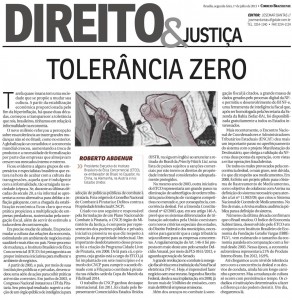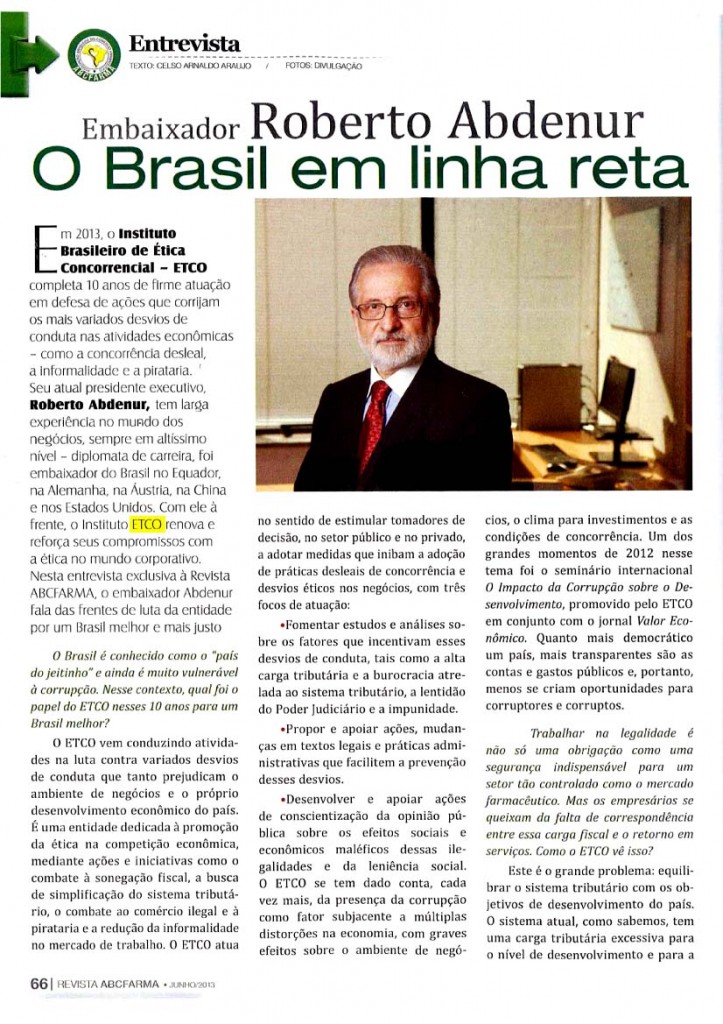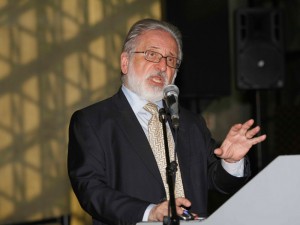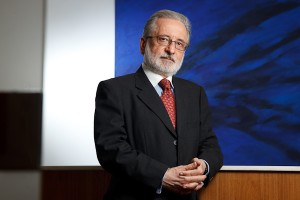June 2013 | Economic Environment | Interview
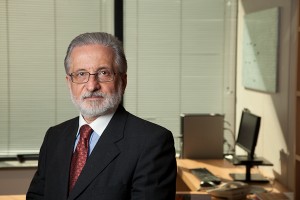
June 17, 2013 | This year, the Brazilian Institute of Ethics in Competition (Etco) is ten years old. To celebrate, it promotes a debate agenda distributed between Rio de Janeiro, Brasília and São Paulo, in order to analyze the evolution of the competition scenario in Brazil. “One of the highlights of this period was the great advance of Brazilian civil society”, says ambassador Roberto Abdenur, executive president of the Institute. In an interview with Conjuntura Econômica, Abdenur also addressed the study carried out in partnership with FGV / IBRE on informality in Brazil, and the country's position when it comes to the global competitive environment.
Economic Situation - How do you evaluate the evolution of the competitive environment in Brazil since the creation of Etco, in 2003?
Roberto Abdenur - In the first event that we held, in Rio de Janeiro, the evaluation was positive regarding the fact that the country makes significant improvements in its business environment with regard to the importance of fair and balanced competition in combating tax evasion, strengthening institutions. And also the need for more transparency in the relationship between the tax authorities and taxpayers, based on a broader concept of fiscal citizenship with a view to developing a partnership relationship, rather than distrust, as sometimes still occurs.
CE - What are the main advances and setbacks of the period?
RA - The country's development since the re-democratization, the improvement of income and the easy access to information have made Brazilian civil society to develop extraordinarily. Even more than it was possible for the institutions to accompany it. So much so that there are always new demands to meet. But there is no doubt that there were important movements aimed at economic stabilization, the development of more solid institutions, with more modern laws. As an example, I can mention the creation of the Federal Comptroller General (CGU), the law on access to information, the creation of the National Justice Council - with supervisory and monitoring bodies -, and the parallel creation of new legal and administrative instruments for improve the dialogue between society and its leaders. But we still have serious problems, such as the sluggishness of the Judiciary, as well as the complexity of the Brazilian tax system, which is far below what the country needs to have a more dynamic economy, so that society can continue rising to higher levels of development .
CE - The latest version of the study “Underground Economy”, carried out by Etco in partnership with FGV / Ibre, in December 2012, points to a slowdown in the reduction of informality in the country. What is the reason for this trend?
RA - Since 2003, there have been many government initiatives that have contributed to the reduction of informality. This, combined with good economic performance, with the increase in formal employment, created a positive environment for a reduction of informality from 21% of GDP in 2003 to just under 17% now. But we have reached a stage where the general circumstances, the status quo, do not allow us to see further progress in terms of reducing informality, which is still high. Although measures such as the Microempreededor Individual (MEI) and Simples tax regimes are commendable, we have to move forward on more structural points, such as the increase in schooling. I was impressed to see in a TV report that many people who are in the informal sector today have no idea how to formalize and what the benefits of formalization are.
CE - How do you evaluate Brazil's position as an actor in the context of global competition, with the country being one of the most closed economies in the world?
RA - We are the most closed economy of the G-20, and naturally an environment of low permeability, of less interaction than is desirable with the outside world, does not facilitate further progress in terms of modern institutions and laws in Brazil. Global competition is somewhat outside the scope of what has been our debate, but I would say that the more open Brazil is to the world, the more chance it will have to progress. Now, when we talk about the closed economy, we are saying that the coefficient of exports and imports is low in relation to GDP. Painting an isolation picture as a result does not correspond to the truth, since Brazil has received an average of US $ 60 billion in foreign direct investment in recent years, with a productive effect on the economy. Today you have a phenomenon that 20 years ago did not exist, which is that of Brazilian multinationals spreading around the world. These large companies enter an international business that is very sophisticated, demanding, in which it is not enough for you to be efficient and competitive. You have to be compliant, in the sense of fulfilling your duty with regard to standards of behavior, social responsibility, environmental responsibility, and fighting corruption.
CE - As an ambassador with a broad history of representing the country, what is your assessment of the victory of Roberto Azevêdo to the directorate-general of the World Trade Organization (WTO)? What indirect benefits can this result bring to Brazil?
RA - Firstly, it was a good result for Roberto Azevêdo's personal merit, as he is a great professional. With my long memory of foreign policy - after all, I joined Itamaraty in 1963 - I also see that this election reflects the recognition of a very noble trajectory of Brazil in the GATT (General Agreement on Trade and Tariffs, in Portuguese) and in the WTO. This is a curious paradox, because Brazil has historically accounted for just over 1% of international trade, but it has always been a decisive actor. Now, as general director, Roberto naturally leaves the sphere of representing the interests of Brazil, as he will have to act independently and sometimes even in dissonance with our interests. On the other hand, Brazil cannot condition its postures to the concern of Roberto's success.
CE - What is the focus that Brazilian foreign policy should have today?
RA - At the moment, Brazil needs to make a deep reflection involving businessmen, government, academic circles, civil society, press, about what our international insertion will be in the future. Brazil is lagging behind in several important movements that occur in the international economy. In this sense, it is on the sidelines of very important processes that tend to bypass the WTO. We have every interest in strengthening the WTO, both as a standards-setter and as an arbitration body for disputes, and as a factor of commercial liberation. But it is difficult to move on these three lines at the same time. And we are seeing a proliferation of bilateral regional and interregional trade and investment agreements that will, in many cases, tend to set new standards, introduce new themes, and require a major update of thinking. We have three cases that should call attention: the Transpacific strategic agreement, the US trade and development partnership with the European Union, and the Pacific Alliance, the latter involving Chile, Peru, Colombia and Mexico. These Latin American countries are not turning their backs on Brazil, but are acting on the basis of a very clear view that their interests have to do with Asia and international free trade. So we cannot depend only on the WTO, nor can we be tied indefinitely to a Mercosur that is paralyzed and that has fallen back in many cases, where a great partner, Argentina, is in a very difficult situation, very protectionist. There is a tram that will pass here within our reach, which is the resumption of free trade negotiations with the European Union. It’s a subject that has been going on for over 12 years without progress and now D Day is coming, a definition of whether Brazil will embark alone, or will be accompanied by countries like Paraguay and Uruguay in serious negotiations, or will be restricted to Mercosur, that is languishing. It is a moment that deserves much debate and reflection.


